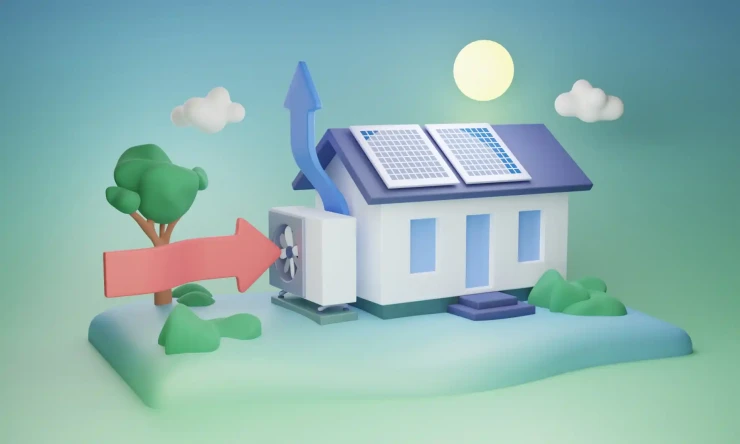According to leading assessors EPC For You, as of April 2018, anyone wanting to sell a property, or landlords wishing to tenant their property, will need to ensure their property has an energy efficiency rating of no lower than Grade E. As a result of this, many people have been wondering about the best ways to raise their EPC rating, while keeping their monthly costs to a minimum. So, today we will be looking at the effects of renewable technologies on an EPC rating.
In order to best answer this question, it is important to first understand what renewable energy technologies are and also, where they are sourced: Renewable energy uses natural resources which are also replenished naturally, like tides, wind, sunlight and geothermal heat. These renewable forms of energy have to make use of an energy, which is naturally quite dispersed, and so it needs to be concentrated into a form that can be readily used. This means that they do tend to be relatively costly to install, however, once installed, they are usually quite cheap to operate.
Almost all energy, until the Industrial Revolution, used to come from natural sources, although the use of it was mostly rather inefficient. Our modern day technology, however, is able to capture much more of this naturally occurring energy and convert it into readily available electricity. Today we have solar thermal panels, for heating water, we have photovoltaic panels to capture solar energy and to convert it into electricity and we can also use biomass, which is fuel derived from wood or other plants, which are often sustainable crops, specifically grown for that particular purpose. Some biomass power stations even capture the wasted heat from the combustion process and use it to heat homes and factories that are not too far away. This is known as biomass combined heat and power (CHP). We also have ground source heat pumps, which extract the sunlight energy that has been absorbed into the ground - and there are also air source heat pumps available today. These heat pumps make indirect use of the sun's energy by extracting the residual warmth from the air and then passing it through a heat exchanger, in order to provide warmth for buildings.
Wind is another source of naturally occurring energy, which has been used for centuries for the grinding of grain and also to pump water. Our modern-day wind turbines are used, both on and offshore, to harness the wind in order to generate electricity. Wind power is currently known to be one of the cleanest and safest of all of the renewable, commercial methods of generating electricity.
For thousands of years, people have been using water wheels to harness the energy produced by moving water in order to generate the energy necessary for turning mills and later, even machines. In the UK today, there are very efficient water turbines and hydropower currently produces 2% of all their required electricity. There is still the potential to harness even more hydropower from large dam projects, across the UK.
The UK has an official target of producing 15% of all its energy from renewable sources by the year 2020. Considering that now, in 2018, it is still only producing 5% of its energy in through those means - there is still a very long way to go. There are currently a number of incentives, which are being offered by the British government to encourage British citizens to generate their own electricity, through the use of low carbon technology or renewable energy, like the Feed In Tariff (FIT), which was implemented in 2010. As long as the amount of power generated by an individual is less than 5MW per year, there is a government scheme that offers to pay back a certain amount to the generator towards the electricity that has been used, and also for any excess electricity which has been exported back into the grid. There is also the renewable heat incentive (RHI), which was introduced in 2011 to encourage homeowners, businesses and communities through financial reward to source their heat through renewable or low carbon sources.
There are increasing numbers of reports and studies, which show that the UK is capable of obtaining most of its energy from renewable resources. There is the WWF-UK that claim that by 2030, up to 90% of British electricity could come from a combination of solar panels, tidal and other renewable and sustainable resources, with the rest being supplied by an international supergrid and also gas power stations.
This clearly shows that the British government is encouraging its people to become more sustainable in their use of power. It also clearly demonstrates that renewable technologies can only have a positive effect on EPC ratings and this will hopefully encourage all citizens to help the UK to attain its target of producing 15% of all its energy from renewable sources by the year 2020.





























